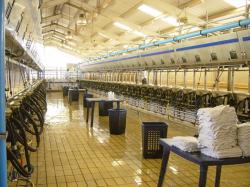IDFA: Dairy Proposal Includes Taxes & Policies That Will Impact Job Growth
July 15, 2011 | 3 min to read

WASHINGTON — The following statement can be attributed to IDFA President and CEO Connie Tipton regarding draft legislation related to dairy policy that was circulated today by Rep. Collin Peterson, ranking member of the House Agriculture Committee.
"We are disappointed that Rep. Collin Peterson is circulating draft legislation that clearly would take the dairy industry in the wrong direction. Instead of encouraging job growth and reducing regulation on an already overregulated industry, the discussion draft would impose new and intrusive government mandates on dairy markets at the cost of a growing dairy export business and the jobs that have come with it.
"The centerpiece of the discussion draft is a new mandatory program that will impact every dairy producer and processor in our country. This program, called the Dairy Market Stabilization Program, is designed to limit U.S. milk production by collecting taxes from dairy farmers when farm milk prices are low. Our estimates show that nearly $400 million would have been assessed against dairy farmers had this program been in effect in 2009. According to Rep. Peterson's bill, half of this new dairy farmer assessment will be retained by the federal government to offset other spending or reduce the deficit.
"Because 'growth management' government programs manipulate farm milk prices to be above world market prices, the stabilization program will negatively impact the U.S. dairy industry's ability to compete for new and emerging markets. Dairy exports will be hurt and imports will be encouraged. Studies of the program have predicted that thousands of U.S. jobs could be lost as a result.
"At a time when the world needs food and is demanding more dairy products, it makes little sense for our government to impose limits on milk production. In addition, higher milk prices will mean that our federal feeding and nutrition programs will have their limited and stressed budgets stretched even further. The same is true for millions of families with children who are struggling economically. Higher prices for dairy products will encourage substitution of less healthy or nutritious food.
"In addition, the discussion draft suggests changes to the Federal Milk Marketing Order system. This is one place where the explanation of the draft does not match the actual draft. For example, the explanation claims that the goal is to simplify the system yet the bill's order reform section is more than 60 pages long. The explanatory text also claims that the new system will remove 'formula pricing' and reduces the classes of milk from four to two — yet it keeps formula pricing for plants that are owned primarily by co-ops and effectively retains the current four classes of milk.
"We appreciate Rep. Peterson's work on this issue and agree that this could be a turning point in changing our dairy policies. However, the problem isn't too little regulation – it's too much. The solution is not to get government more involved in our markets, but to let our industry grow and produce jobs."
For additional information:
IDFA Position on Foundation for the Future Proposal:
http://www.idfa.org/news–views/news-releases/details/5862/
Analysis of Dairy Market Stabilization Program proposal IDFA Chief Economist Robert Yonkers Ph.D.: http://www.idfa.org/files/A_Look_at_Dairy_Market_Price_Volatility_5-25-11.pdf
The International Dairy Foods Association (IDFA), Washington, D.C., represents the nation's dairy manufacturing and marketing industries and their suppliers, with a membership of 550 companies representing a $110-billion a year industry. IDFA is composed of three constituent organizations: the Milk Industry Foundation (MIF), the National Cheese Institute (NCI) and the International Ice Cream Association (IICA). IDFA's 220 dairy processing members run more than 600 plant operations, and range from large multi-national organizations to single-plant companies. Together they represent more than 85 percent of the milk, cultured products, cheese and frozen desserts produced and marketed in the United States. IDFA can be found online at www.idfa.org.
Source: International Dairy Foods Association
